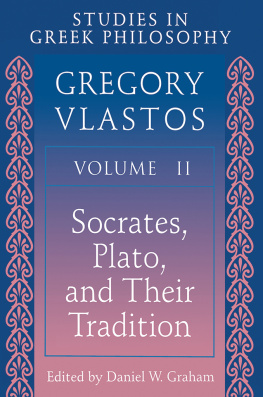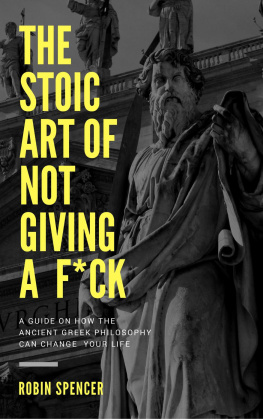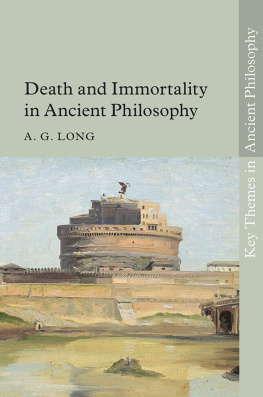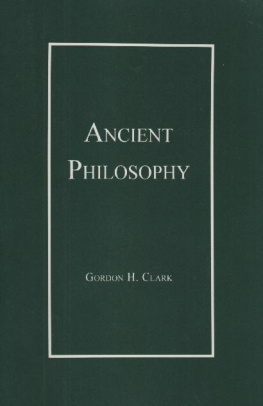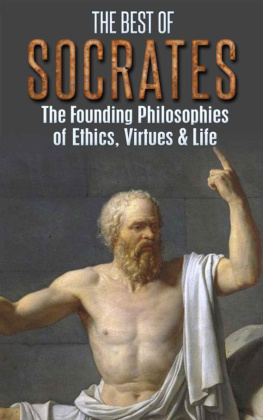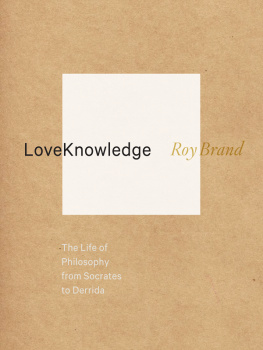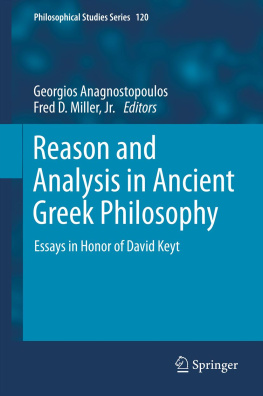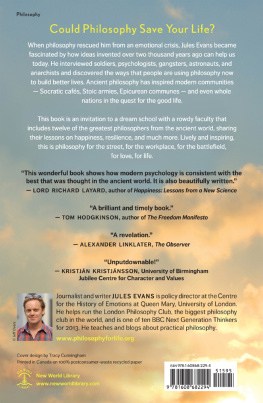PURSUITS OF WISDOM

Pursuits of Wisdom
Six Ways of Life in Ancient Philosophy
from Socrates to Plotinus
John M. Cooper

Copyright 2012 by Princeton University Press
Published by Princeton University Press, 41 William Street, Princeton,
New Jersey 08540
In the United Kingdom: Princeton University Press, 6 Oxford Street, Woodstock,
Oxfordshire OX20 1TW
press.princeton.edu
Jacket art: Francesco Rustici detto il Rustichino, Wisdom and Prudence, c. 1620, courtesy of Scala/Art Resource, NY.
All Rights Reserved
Library of Congress Cataloging-in-Publication Data
Cooper, John M. (John Madison), 1939
Pursuits of wisdom : six ways of life in ancient philosophy from Socrates to Plotinus / John M. Cooper.
p. cm.
Includes bibliographical references (p. ) and index.
ISBN 978-0-691-13860-2 (hardcover)
1. Philosophy, Ancient. 2. Wisdom. 3. Conduct of life. I. Title.
B111.C67 2012
180dc23 2012002204
British Library Cataloging-in-Publication Data is available
This book has been composed in Garamond Premier Pro
Printed on acid-free paper.
Printed in the United States of America
10 9 8 7 6 5 4 3 2 1
For G.E.L. Owen and Michael Frede
In Memoriam
CONTENTS
PREFACE
My first idea for a book on ethical theory in ancient philosophy came in the 1970s: at that point it was to encompass Plato, Aristotle, and Hellenistic philosophy. My friend Jerry Schneewind, then a colleague at the University of Pittsburgh, proposed a joint project of a three-volume history of ethics: ancient ethics by me, post-Renaissance ethics by him, and someone (to be discovered) to deal with the intervening late ancient, medieval and Renaissance periods. Jerry eventually published his remarkable and ground-breaking The Invention of Autonomy (1997)not exactly the envisaged general history of modern ethics, but quite close enough. Later, other friends, notably Myles Burnyeat and Michael Frede, insisted that the expanding field of ancient philosophy really needed a comprehensive study of ancient moral and ethical theory, and urged me to fill this gap. I agreed with them about the need (this was in the early 1990s, before Julia Annas had published The Morality of Happiness). But what theme could one use to weave a truly comprehensive, philosophically live history of the ancient tradition, which by this time had to include late ancient Platonism? I didnt have the stomach for a traditional critical report on what current scholarship in the field says about Socrates ideas about virtues, Platos accounts in the Republic of virtue and happiness, and about pleasure in the Philebus, Aristotles ethical theory, the controversies surrounding Stoic and Epicurean ethics, and Plotinus spiritualist and Platonist conceptions of the human person and the human good. So, while I continued to write scholarly articles on topics in ancient ethics, moral psychology, political philosophy and related matters that struck me as interesting and needing attention, the book languished inchoate.
I found my theme about ten years ago through reading English translations of the late Pierre Hadots remarkable and highly stimulating work on ancient Greek philosophy as a way of life: Philosophy as a Way of Life (1995) and What Is Ancient Philosophy? (2002). Fascinating and even inspiring though I found Hadots ideas, his understanding of ancient philosophy, and of in what way it could be a full and complete way of life for its adherents, seemed to me to omit virtually altogether the central and indispensable place in philosophy (in Greece and ever since) of rigorous analysis and reasoned argumentation. As the first fruit of my liberating encounter with Hadots work I published an essay in 2007, in Dominic Scotts festschrift for Myles Burnyeat, on Socrates and Philosophy as a Way of Life, in which I explained my dissatisfaction with Hadots conception of philosophy, and marked out my own new path toward conceiving, not ancient philosophy itself as a way of life (as if ancient philosophy were a unique and special genre of philosophizing), but specific ancient philosophiesin fact the six to which this book is devotedas ways of life.
In writing this book, my ambition has been to discuss, both as a unified tradition and as a set of widely diverging individual philosophies, the main ideas and theories of pagan Greek moral philosophy as a wholein a continuous tradition from Socrates, the originator of full-blown ethical theory in our Western tradition, down to the Platonists of late antiquity. I hope to show my readers both how wonderfully good and, above all, interesting the philosophies of antiquity are, both individually and in the full sweep of this traditions history, when considered as offering ways of life. I want to show first, how good and strong these philosophies are in strictly philosophical termsas carefully, coherently and plausibly reasoned sets of all-inclusive proposals for understanding human nature, human values, and the best way of living a human lifebut also, second, how clear, and even compelling, these philosophies are as potential guides to living, for anyone who has any inclination to live their life on the basis of reasons they can understand and approve, after critical reflection of their own concerning what reason itself tells us about how we should live. It is true, of course, that our own cultures and historical circumstances differ in many ways from those of antiquity, and we see in ancient philosophy some basic assumptions that we cannot easily accept in the climate of twenty-first century philosophy. But we can set those aside, and consider the ancient theories, nonetheless, in the light of them. My own experience, which I hope my readers will share, is that these theories open up illuminating and clarifying perspectives that can both enrich our contemporary philosophical thought, and open the prospect of new self-understandings that might allow us to embrace philosophy as a way of life, in the ancient mannerto some extent, at any rateeven in our very changed modern circumstances.
With these ambitions, I have attempted to make the ancient philosophies that I discuss accessible to philosophers, and students of philosophy, with little or no familiarity with specialist scholarship within the now burgeoning philosophical sub-field of ancient philosophy. But I have hoped to make the book equally accessible to readers interested in philosophy, and in the idea of philosophy as a guide to life, with little formal background in the academic field. I have avoided unexplained specialist terminology, untranslated Greek words, and technical or quasi-technical terms of philosophy, in favor of as direct and plain contemporary English as I was able to manage. Even though many of the ancient philosophers ideas are unfamiliar and even surprising to a twenty-first century reader, and their arguments are often complex and difficult, I hope to have made good and clear sense, even for less philosophically adept readers, both of what these ideas actually amount to, and the philosophical reasons that the philosophers in question rested their theories on.
With the interests of non-specialist readers in mind, I have excluded from my main text discussion of scholarly details and scholarly disputes (including interpretations alternative to my own), as well as all specific references to texts of ancient authors that I rely on in my presentations and critical discussions. Such textual references are liberally provided in the footnotes, where I also inform the reader (sparingly) about alternative interpretations and approaches from my own, and cite the work of other scholars and philosophers. I also provide in footnotes what seemed essential background information concerning ancient authors and texts, including English translations where available; this is followed up in the lists of Readings for each chapter that are assembled at the back of the book. Longer discussions, particularly those of special or exclusive interest to ancient philosophy experts, are relegated to Endnotes. I hope this somewhat unusual division of laborfootnotes for the most essential information readers should take into account as they proceed through the book, plus endnotes for more extended discussion of particular points that arisewill prove easily manageable and convenient.
Next page

